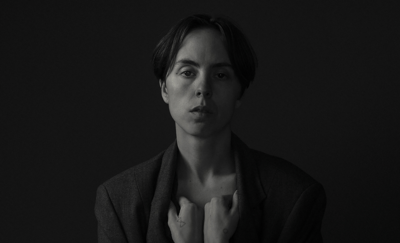
The title of Placeholder, the new LP from Meg Duffy’s project Hand Habits, might remind music writers of The Breeders’ 2002 album Title TK. (“TK” is journalist jargon, a shorthand placeholder for information you don’t yet have.) But Placeholder doesn’t feel at all tentative. For the singer-songwriter-guitarist, it’s the most deliberate record in a seven-year run of nearly constant collaboration.
Placeholder “definitely feels like my introduction to this project,” Duffy tells the Scene, “and the introduction in a public sense, too.”
Released by stalwart Nebraska label Saddle Creek and recorded at Bon Iver main man Justin Vernon’s Wisconsin home studio April Base, the 11-song set marks the first time Duffy (who prefers they/them pronouns) has been freed up to give Hand Habits their full attention. A native of Amsterdam, N.Y., they picked up the guitar at age 17 and christened the Hand Habits moniker with Pinky Demos, a 2012 EP recorded at their home in Albany.
After honing their six-string skills in a variety of local bands in the Empire State’s capital city, in 2015 Duffy caught the attention of Kevin Morby, a Bob Dylan- and Leonard Cohen-indebted singer-songwriter who was touring through. Seeking a second guitarist, the Kansas City-raised, Los Angeles-residing Morby drafted Duffy into his band — a decision that ended up being a game-changer for both artists.
The pair’s chemistry was so strong that Duffy stayed on with Morby through 2018, relocating to L.A. and picking up session work between tours. Duffy played slide guitar on The War on Drugs’ “Holding On” (from the Philly band’s Grammy-winning 2017 album A Deeper Understanding) and electric guitar on Nashville native son and fellow SoCal transplant William Tyler’s early-2019 album-of-the-year candidate Goes West. Duffy has also been a touring member of Mega Bog, the revolving-door band of witchy Northwest singer-songwriter Erin Birgy.
In 2017, right in the middle of this very busy period, Duffy also issued the first Hand Habits full-length, Wildly Idle (Humble Before the Void), a ruminative, understated collection whose earthy aloofness places it in the same sonic sphere as home-recordist-songwriter types Phil Elverum (Mount Eerie) and Liz Harris (Grouper).
“It was just me,” says Duffy, explaining the debut’s low-key, lo-fi trappings, “and it’s hard to get a rhythm-section feel by yourself, in your room, with just a tom and one mic.”
In contrast, Placeholder is a full-band rock record, with tunes like “Pacify,” “What’s the Use” and “Can’t Come Down” conveying cutting sentiments via a pastoral, West Coast-style country sound (think Zuma-era Neil Young, or the criminally underrated songsmith Stephen Steinbrink). The title track, which opens the album, is a bitter but catchy paean to being someone’s fallback rather than their first choice, with Duffy’s simmering contempt deepening with each tightly written stanza. It’s not all angst though; the mellower “Jessica” and “Book on How to Change Part II” find Wildly Idle’s languid pace carrying over but the instrumental palette expanding. (Bassist Keven Lareau and drummer John Andrews round out the power-trio iteration of Hand Habits that will appear Sunday at The End.)
Press materials point out that Duffy wrote Placeholder during fire season in Southern California in winter 2017 — a notable presence in at least one song, “Wildfire.” Duffy points out, however, that the album was actually written over a span of two years. “The song ‘Can’t Come Down’ I started on tour three years ago,” Duffy says, “thought I would never finish it and then, when I was gathering songs for this one, found it in my voice memos and finished it pretty easily.”
There’s a difference between being timid about writing and being patient with songs, and you can hear the latter throughout Placeholder. For Duffy, letting the writing process unfold at its own pace is the only way to tackle it.
“Every time I finish a song I’m like, ‘That was it. That could be the last one I ever write. I don’t know if another one will come.’ You just have to get yourself into the space and the headspace where you know songs have come before.”





